Beyond mere gatherings, discover the profound significance of 'convocation' in the Bible and its lasting impact on faith and community.
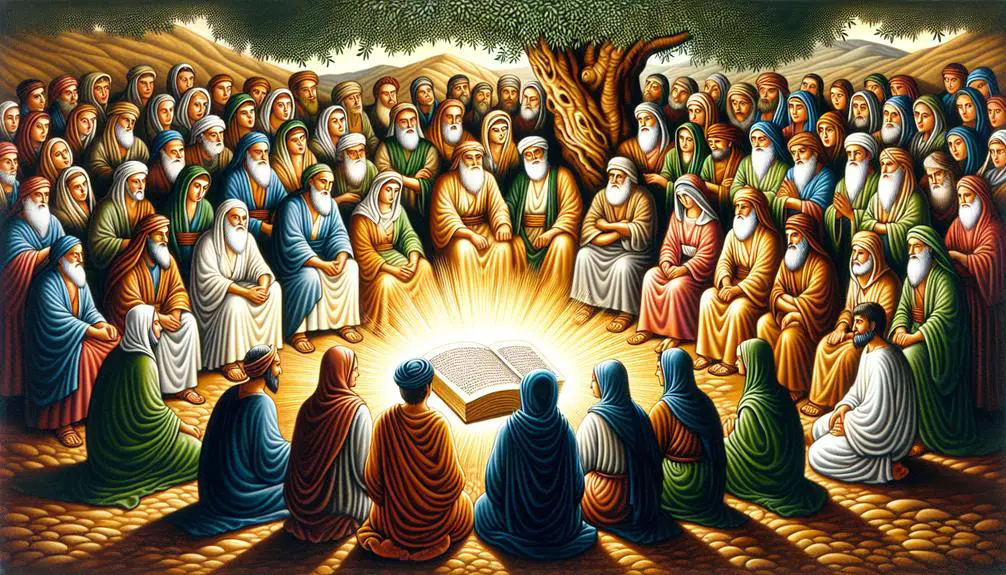
Define Convocation in the Bible
In the vast expanse of the Bible, the term 'convocation' stands quietly amidst thunderous narratives and divine commandments, yet it holds a significance that's anything but modest.
You'll find its roots deeply embedded in the rituals and ceremonies of ancient times, often evoking a sense of community and spiritual dedication.
As you explore the origins of convocation, from its mention in the Torah to its impact on modern practices, you'll uncover layers of meaning that transcend simple gatherings.
This journey into the biblical definition of convocation promises to reveal not just historical insights but also reflections on its enduring relevance.
Why does this matter to us today? Let's find out together.
Key Takeaways
- Convocation in the Bible denotes spiritual gatherings commanded by God for worship, reflection, and communal bonding.
- It symbolizes the deep relationship between divine will and the community's adherence to faith and tradition.
- Biblical convocations include significant events like the Sabbath, Passover, and the Day of Atonement, each with specific spiritual purposes.
- These gatherings reinforced communal identity, transmitted cultural heritage, and maintained religious observance in ancient Israelite society.
Origins of Convocation
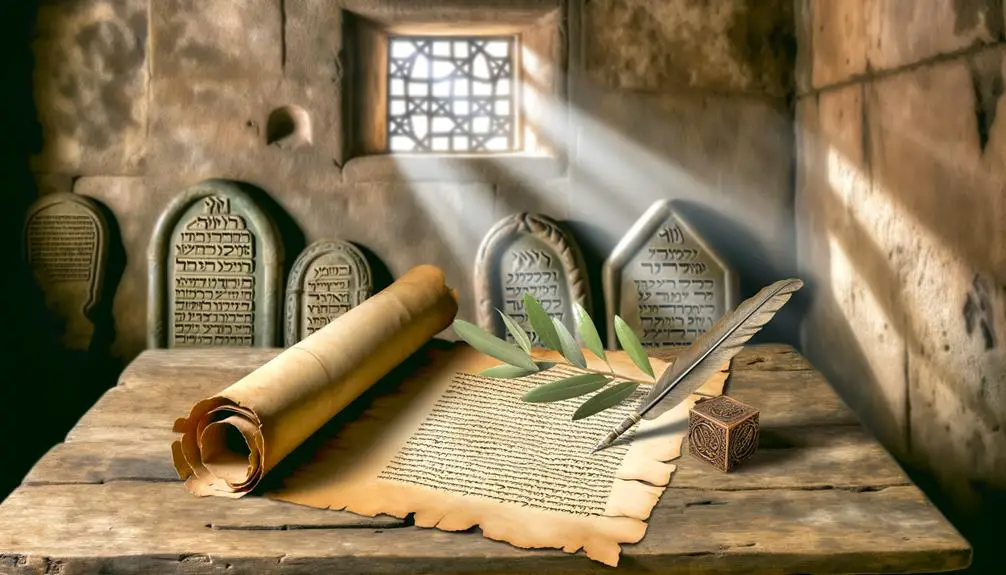
The term 'convocation' finds its roots in ancient religious practices, specifically within the context of biblical traditions where it was utilized to denote gatherings or assemblies called by God for worship or other sacred purposes. This concept, deeply embedded in cultural roots, extends beyond mere meetings to encompass a broader spectrum of religious interpretations, reflecting the intricate relationship between divine command and communal response.
In exploring the origins of convocation, you'll discover that its significance isn't merely liturgical but also cultural. The practice of convocation serves as a tangible manifestation of the community's adherence to divine guidance, illustrating a collective commitment to faith and tradition. This aspect underscores the multifaceted nature of convocations, which aren't only spiritual gatherings but also events steeped in cultural identity and religious heritage.
Moreover, the evolution of the term and its applications reveals a dynamic interplay between historical contexts and religious interpretations. As societies evolved, so too did the understanding and practice of convocation, adapting to meet the spiritual needs of the community while retaining its foundational purpose. This adaptability highlights the resilience and enduring relevance of convocation within various religious traditions, marking it as a vital component of spiritual life.
Therefore, in analyzing the origins of convocation, it's crucial to recognize its role not just in facilitating worship but also in fostering a sense of unity and continuity among believers. Through this lens, convocation emerges as a complex concept that embodies the collective expression of faith, bridging the gap between ancient traditions and contemporary religious practices.
Convocation in the Torah
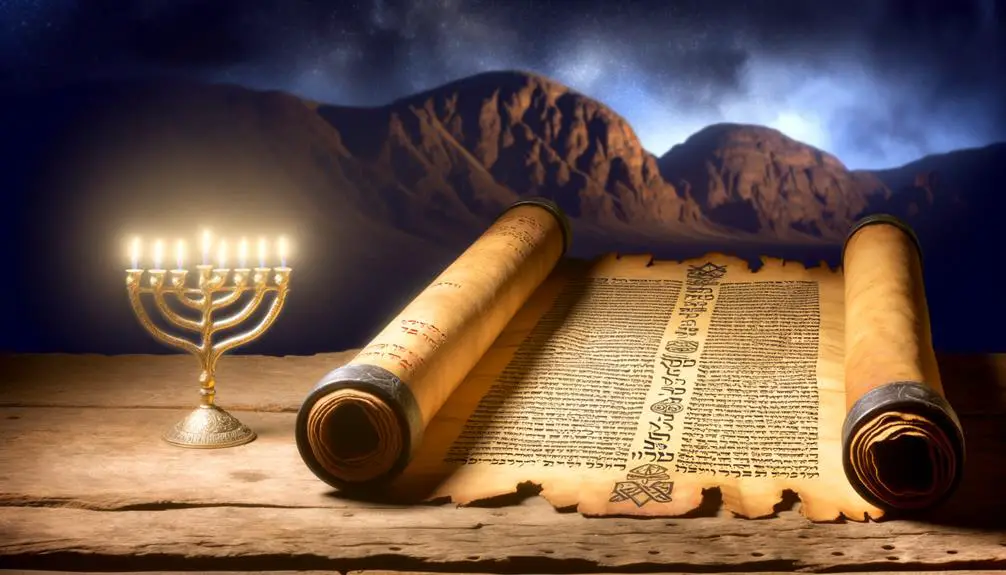
Building on the understanding of convocation's origins, we'll now explore its specific manifestations and regulations within the Torah, shedding light on its pivotal role in ancient Israelite society. The Torah extensively outlines how convocations, especially Sabbath gatherings, were central to maintaining communal and religious cohesion. These gatherings were not merely social or religious events but acted as a cornerstone for instruction, worship, and the reinforcement of national identity.
The Levitical roles in these gatherings were crucial. The Levites, a tribe set apart for religious duties, facilitated these convocations, ensuring that the rituals and teachings adhered to the laws given by God. Their responsibilities ranged from leading worship to instructing the Israelites in the law, highlighting the integral part they played in the spiritual and communal life of the people.
To add depth and complexity, consider the following table outlining key aspects of convocations in the Torah:
Aspect |
Description |
Significance |
|---|---|---|
Sabbath Gatherings |
Weekly rest and worship day mandated in Exodus 20:8 |
Reinforced communal identity and religious observance |
Levitical Roles |
Levites' duties in managing and leading convocations |
Ensured adherence to divine laws and facilitated worship |
Communal Cohesion |
Gatherings served as a means to unite the community |
Strengthened the bonds among the Israelites and with God |
This exploration reveals that convocations in the Torah were foundational to the Israelites' religious practice and community life, serving as a vital link between the divine and the daily lives of the people.
Types of Biblical Convocations
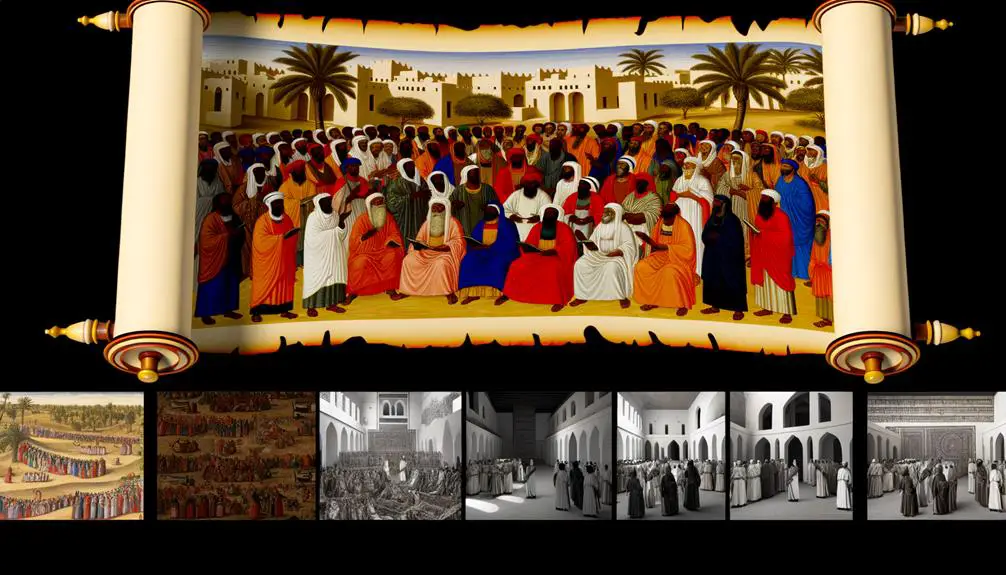
Exploring various types of biblical convocations reveals their diverse purposes and roles within ancient religious practices. These gatherings, central to the spiritual and communal life of ancient Israelites, ranged from weekly observances to grand annual festivals. Each type held significant meaning and offered unique opportunities for worship, reflection, and communal bonding.
- Sabbath Gatherings: Occurring weekly, Sabbath gatherings were foundational to Jewish religious life. These convocations weren't merely restful pauses but moments for communal worship and reflection. The Sabbath served as a constant reminder of God's creation and the Israelites' deliverance from Egypt, reinforcing a collective identity and faith.
- Passover: This feast celebration marked the beginning of the agricultural year and commemorated the Exodus from Egypt. It was a time of remembrance and gratitude, deeply embedded with historical and spiritual significance, reminding the community of their liberation and the beginnings of their covenant with God.
- Feast of Weeks (Shavuot): Celebrated seven weeks after Passover, this feast marked the giving of the Torah at Mount Sinai. It was a convocation steeped in gratitude for the harvest and the divine law, highlighting the interconnectedness of physical sustenance and spiritual nourishment.
- Day of Atonement (Yom Kippur): Perhaps the most solemn convocation, it was a day dedicated to repentance and reconciliation with God. This annual observance was a profound communal undertaking of fasting, prayer, and reflection, aimed at spiritual purification and renewal.
Each of these convocations served distinct purposes, from celebrating divine deliverance to ensuring communal repentance and spiritual alignment. They underscored the rhythms of ancient religious life, embedding sacred moments into the fabric of everyday existence.
Significance in Ancient Practices
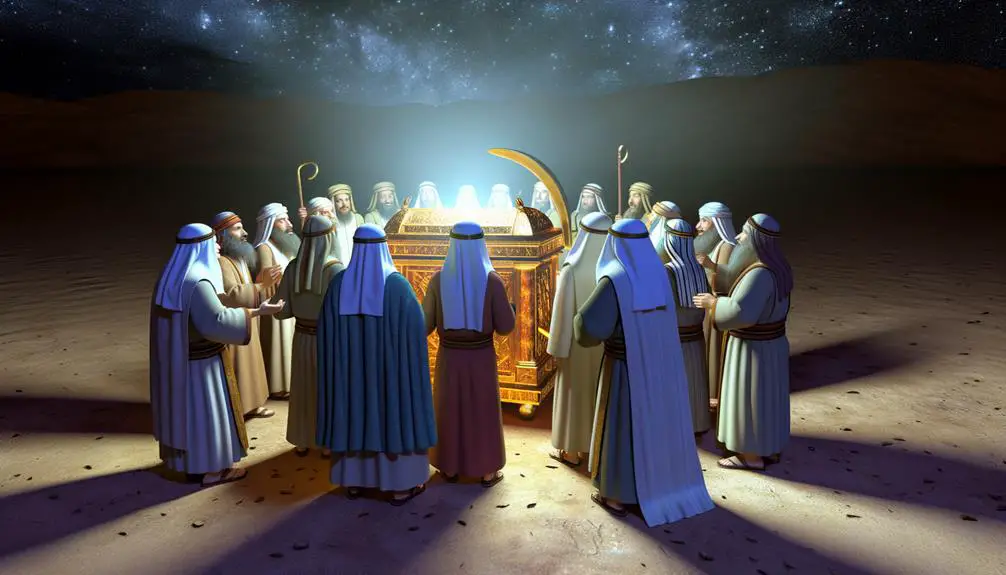
Ancient practices deeply embedded convocations into the fabric of societal and religious life, serving as pivotal moments for communal engagement and spiritual reflection. These gatherings weren't mere formalities but were integral to maintaining the cultural and spiritual ethos of a community. They carried profound cultural implications, shaping the identity and cohesion of ancient societies.
Convocations weren't only about the assembly of individuals but also about the meticulous preparation that went into them. This preparation extended beyond the spiritual, encompassing the physical and visual through ceremonial attire. Such attire wasn't merely for adornment but signified one's role, status, and participation level within the convocation. This clothing served as a visual testament to the sacredness of the event, delineating the mundane from the divine.
The significance of these gatherings was multifaceted. On one hand, they provided a structured means through which to pass down traditions, laws, and stories, ensuring the continuity of cultural heritage. On the other hand, they fostered a sense of belonging and community among participants, reinforcing social bonds and collective identity.
Moreover, convocations acted as a conduit for divine interaction. Participants believed that through these gatherings, they could commune with the divine, seek guidance, and receive blessings. This spiritual dimension elevated the importance of convocations, embedding them not just in the realm of ritual, but as essential elements of existential and ethical orientation.
In essence, convocations in ancient practices were more than mere gatherings; they were complex events woven into the very heart of societal and religious life, imbued with deep cultural and spiritual significance.
Modern Reflections on Convocation
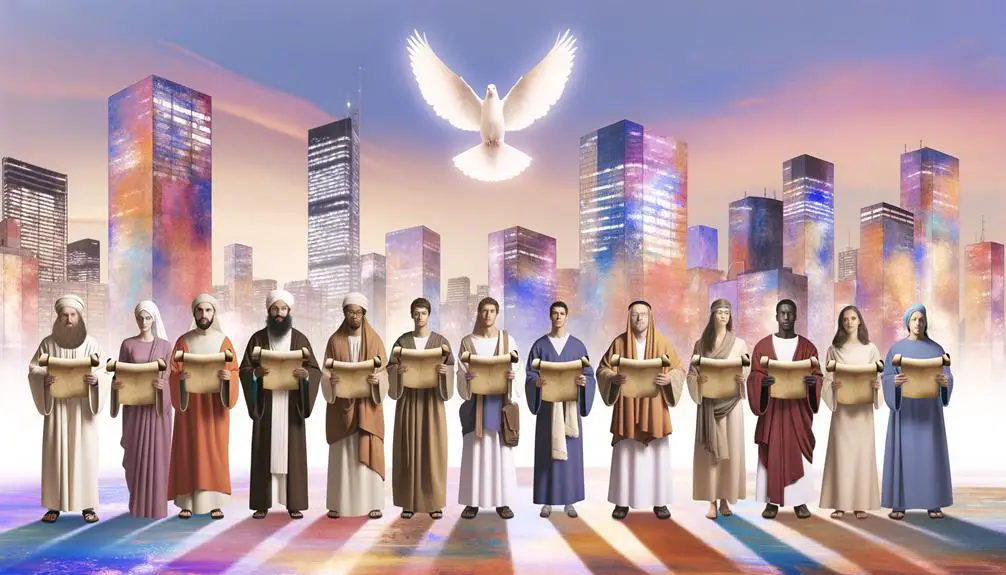
While the roots of convocation lie deeply embedded in ancient practices, its relevance and impact continue to resonate in contemporary society, fostering new interpretations and applications. Today, you might view these gatherings not just as religious observances but as opportunities for community building and spiritual renewal, illustrating the lasting significance of convocation in modern settings.
Consider the following aspects to understand the evolving nature of convocations:
- Community Gatherings: They serve as a bridge, connecting individuals across diverse backgrounds through shared traditions and values. The sense of belonging and community spirit they foster is invaluable in today's fragmented society.
- Spiritual Renewal: In a world where spiritual needs are often sidelined by the hustle of daily life, convocations offer a sanctuary for reflection, prayer, and connection to something greater than oneself.
- Cultural Continuity: These events act as vessels for the transmission of cultural heritage, ensuring that age-old traditions and wisdom are passed down through generations.
- Adaptation and Innovation: Modern convocations have adapted to contemporary needs, incorporating technology and new formats while preserving their core essence.
The analytical lens through which we view these modern manifestations of convocation reveals their multifaceted role in society. They aren't mere relics of the past but living traditions that adapt, evolve, and continue to fulfill human needs for connection, spirituality, and community. As such, the study of convocation in contemporary contexts offers rich insights into the ways in which ancient practices are reinterpreted and revitalized to maintain their relevance and significance.
Frequently Asked Questions
How Do Different Christian Denominations Interpret the Concept of Convocation Today, and How Does It Impact Their Worship and Community Practices?
Different Christian denominations interpret the concept of convocation in varied ways, affecting their worship and community practices significantly.
These denominational differences highlight the diversity within Christianity, with some groups emphasizing formal gatherings, while others may focus on more informal community meetings.
The interpretation of convocation directly impacts how communities come together, pray, and engage in worship, underscoring the importance of understanding these differences to appreciate the full spectrum of Christian practice.
Are There Any Specific Prayers or Rituals Associated With Convocations in the Bible That Are Still Practiced in Contemporary Religious Settings?
You're exploring if specific prayers or rituals from biblical convocations still resonate in today's religious practices.
It's fascinating to note that many contemporary worship forms retain elements from these ancient gatherings.
The prayer formats and ritual significance deeply embedded in convocations have evolved but continue to influence modern ceremonies.
Analyzing these practices reveals a rich tapestry of tradition that shapes how communities come together to worship and commemorate their faith.
How Is the Concept of Convocation Represented and Understood in Other Religious Texts Outside of the Bible, Such as the Quran or the Vedas?
In Islam, the Islamic Hajj embodies this concept, drawing millions to Mecca annually, emphasizing unity and devotion.
Similarly, in Hinduism, the Vedic Yajna, a ritual of sacrifice, gathers communities to perform sacred acts together.
Both examples highlight convocation's universal role in fostering religious solidarity and spiritual reflection, transcending individual practices to reveal a shared human inclination towards collective worship and dedication.
Can the Notion of Convocation Be Related to Secular Gatherings or Meetings in Modern Society, and if So, How?
Yes, the notion of convocation can indeed relate to secular gatherings in modern society. For example, corporate conferences serve as a secular analog, where professionals gather to exchange ideas and strategies.
Similarly, social networks facilitate virtual convocations, allowing people to connect, share, and discuss various topics. These platforms and events embody the spirit of convocation, fostering community and collaboration outside religious contexts.
How Have Historical Events or Societal Changes Influenced the Perception and Practice of Biblical Convocations in Various Cultures Around the World?
You're examining how historical events and societal changes have shaped the perception and practice of biblical convocations globally.
Through cultural adaptations, these religious gatherings have evolved, reflecting current societal norms.
The way communities interpret and integrate these convocations into their lives varies, influenced by local customs, historical context, and social evolution.
This dynamic interplay has led to a rich diversity in the observance and significance of convocations across cultures.
Conclusion
In wrapping up, you've journeyed through the rich tapestry of convocation in the Bible, from its roots in the Torah to its multifaceted expressions and deep significance in ancient practices. Like threads woven through the fabric of time, these gatherings have left an indelible mark on both historical and modern religious observances.
By examining convocations analytically, you've unraveled their layers, revealing their enduring impact on communities of faith and how they echo in today's spiritual reflections and gatherings.

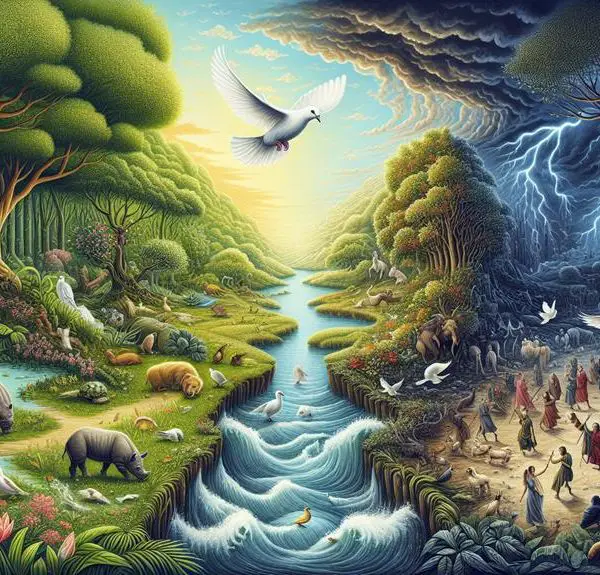

Sign up